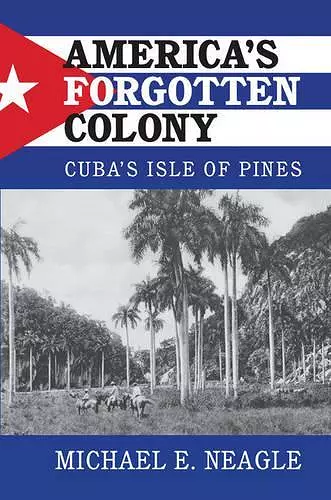America's Forgotten Colony
Cuba's Isle of Pines
Format:Hardback
Publisher:Cambridge University Press
Published:24th Dec '16
Currently unavailable, and unfortunately no date known when it will be back
This hardback is available in another edition too:
- Paperback£24.99(9781316502013)

Analysis of the American presence on the Isle of Pines illustrates how US influence adapted and endured in republican-era Cuba.
As US-Cuban diplomatic relations thaw in the twenty-first century, America's Forgotten Colony examines the ambivalent relationship between Americans and Cubans on the Isle of Pines in the twentieth century. Accessible to specialists, students, and general readers, this book shows how US influence adapted and endured prior to Cuba's revolution.America's Forgotten Colony examines private US citizens' experiences on Cuba's Isle of Pines to show how American influence adapted and endured in republican-era Cuba (1902–58). This transnational study challenges the notion that US territorial ambitions waned after the nineteenth century. Many Americans, anxious about a 'closed' frontier in an industrialized, urbanized United States, migrated to the Isle and pushed for agrarian-oriented landed expansion well into the twentieth century. Their efforts were stymied by Cuban resistance and reluctant US policymakers. After decades of tension, however, a new generation of Americans collaborated with locals in commercial and institutional endeavors. Although they did not wield the same influence, Americans nevertheless maintained a significant footprint. The story of this cooperation upsets prevailing conceptions of US domination and perpetual conflict, revealing that US-Cuban relations at the grassroots were not nearly as adversarial as on the diplomatic level at the dawn of the Cuban Revolution.
'In unearthing the story of the doomed US settlement of Cuba's Isle of Pines, Michael E. Neagle weaves a tale at once complex, sad and always fascinating, a veritable saga of US hegemonic ups and downs in the Caribbean. Displaying elegant writing, remarkable research and careful judgment, America's Forgotten Colony ensures that it will never again be.' Alan McPherson, University of Oklahoma
'Michael E. Neagle has written a superb social history of American Empire in Cuba focusing on the longstanding US attempt to colonize and annex the Isle of the Pines off the southwest coast of Cuba in the early 1900s. His meticulously researched and beautifully written work relies upon a broad range of US, Cuban and Caribbean sources. America's Forgotten Colony makes an important contribution to the growing field of US imperialism studies and earns high marks for its fascinating historical analysis.' Michael E. Donoghue, Marquette University, Wisconsin
'What an impressive study - handsomely written, extensively researched, and interpretatively challenging. Neagle tells the fascinating human story of US settlers on the Isle of Pines as they interacted with native Cubans, strove to make new lives and profits from farms and tourism, lobbied for US annexation, and ultimately failed. In this microcosmic work, Neagle effectively places the sixty year US presence on the Isle in the context of the overarching themes of US expansion and empire, territorial, commercial, and cultural. He discovered a non-violent colonialism by land investors, fruit growers, retirees, and teachers, not by US diplomats or soldiers.' Thomas G. Paterson, author of Contesting Castro: The United States and the Triumph of the Cuban Revolution.
'The revelatory power of the Cuban past is often found within the small histories, those sites that allow the historian to interrogate in close quarters the workings of large systems as a condition of daily life. Neagle's model study of the Isle of Pines is one such history. It offers a probing exploration of US hegemony, rich with insight into the ways that power was exercised and experienced. A very much welcomed addition to the scholarship on US - Cuba relations.' Louis A. Pérez, Jr, University of North Carolina, Chapel Hill
'Neagle (Nichols College) explores the history of US imperialism through the lens of a US settlement on Cuba's Isle of Pines, using this case study to challenge the conventional narrative that direct colonization by the US ended at the dawn of the 20th century. … Neagle elucidates how US settlers sought to consolidate US hegemony through outright annexation, commercial ties, and cultural influence. However, he also suggests that they came in search of better opportunities, evincing middle-class Americans' discontent with life in the US. US influence on the isle declined after 1925 and nearly disappeared after the 1959 revolution. … by reconstructing this failed attempt at colonization, Neagle creatively reimagines traditional diplomatic history by focusing on non-state actors to draw out the cultural dimensions of US imperialism. Summing Up: Recommended. All academic levels/libraries.' CHOICE
'Neagle offers a seamless narrative illuminating a unique chapter in the history of American colonialism.' The Journal of American History
ISBN: 9781107136854
Dimensions: 235mm x 157mm x 23mm
Weight: 570g
318 pages